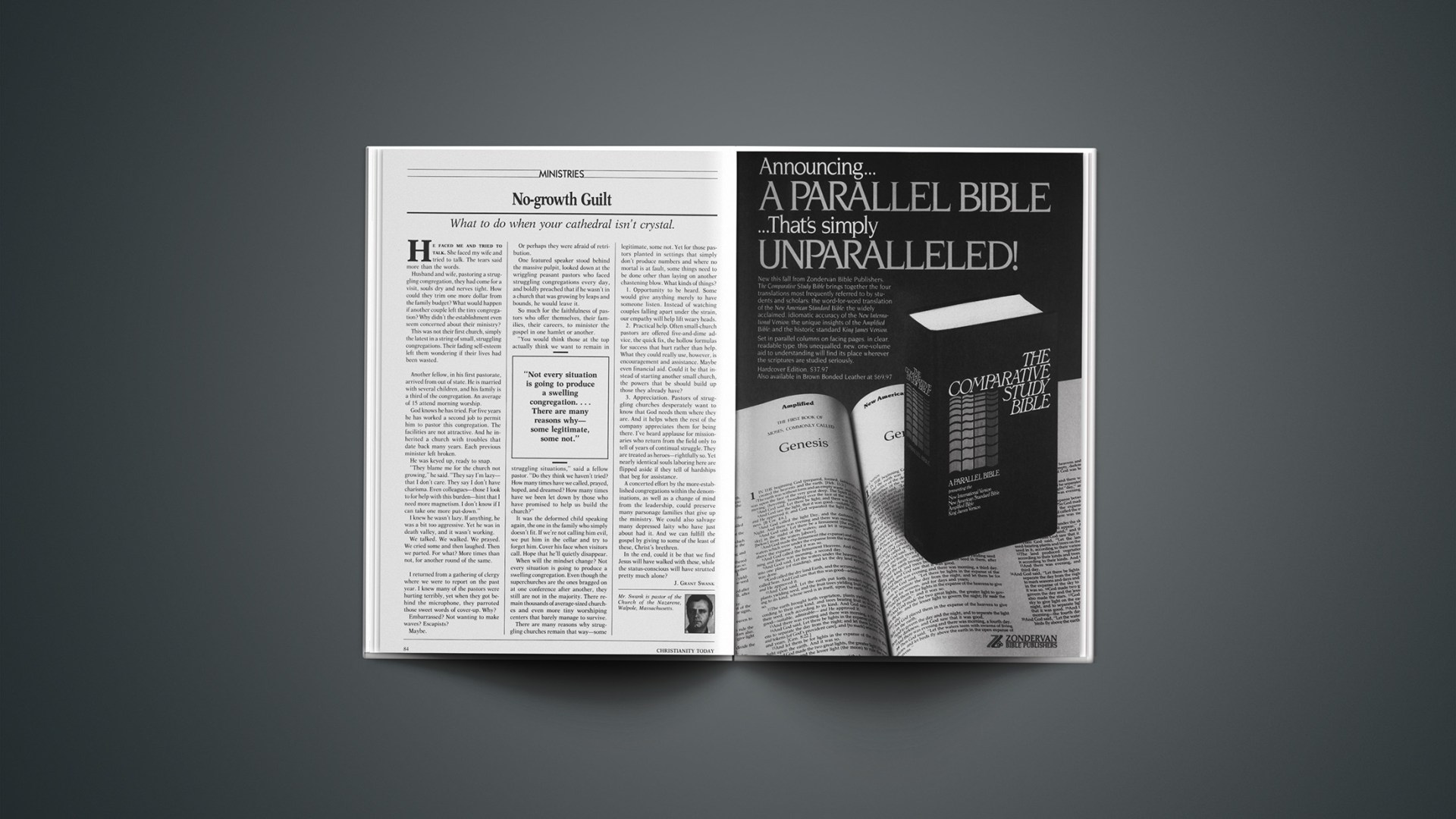Mr. Swank is pastor of the Church of the Nazarene, Walpole, Massachusetts.
What to do when your cathedral isn’t crystal.
He faced me and tried to talk. She faced my wife and tried to talk. The tears said more than the words.
Husband and wife, pastoring a struggling congregation, they had come for a visit, souls dry and nerves tight. How could they trim one more dollar from the family budget? What would happen if another couple left the tiny congregation? Why didn’t the establishment even seem concerned about their ministry?
This was not their first church, simply the latest in a string of small, struggling congregations. Their fading self-esteem left them wondering if their lives had been wasted.
Another fellow, in his first pastorate, arrived from out of state. He is married with several children, and his family is a third of the congregation. An average of 15 attend morning worship.
God knows he has tried. For five years he has worked a second job to permit him to pastor this congregation. The facilities are not attractive. And he inherited a church with troubles that date back many years. Each previous minister left broken.
He was keyed up, ready to snap.
“They blame me for the church not growing,” he said. “They say I’m lazy—that I don’t care. They say I don’t have charisma. Even colleagues—those I look to for help with this burden—hint that I need more magnetism. I don’t know if I can take one more put-down.”
I knew he wasn’t lazy. If anything, he was a bit too aggressive. Yet he was in death valley, and it wasn’t working.
We talked. We walked. We prayed. We cried some and then laughed. Then we parted. For what? More times than not, for another round of the same.
I returned from a gathering of clergy where we were to report on the past year. I knew many of the pastors were hurting terribly, yet when they got behind the microphone, they parroted those sweet words of cover-up. Why?
Embarrassed? Not wanting to make waves? Escapists?
Maybe.
Or perhaps they were afraid of retribution.
One featured speaker stood behind the massive pulpit, looked down at the wriggling peasant pastors who faced struggling congregations every day, and boldly preached that if he wasn’t in a church that was growing by leaps and bounds, he would leave it.
So much for the faithfulness of pastors who offer themselves, their families, their careers, to minister the gospel in one hamlet or another.
“You would think those at the top actually think we want to remain in struggling situations,” said a fellow pastor. “Do they think we haven’t tried? How many times have we called, prayed, hoped, and dreamed? How many times have we been let down by those who have promised to help us build the church?”
It was the deformed child speaking again, the one in the family who simply doesn’t fit. If we’re not calling him evil, we put him in the cellar and try to forget him. Cover his face when visitors call. Hope that he’ll quietly disappear.
When will the mindset change? Not every situation is going to produce a swelling congregation. Even though the superchurches are the ones bragged on at one conference after another, they still are not in the majority. There remain thousands of average-sized churches and even more tiny worshiping centers that barely manage to survive.
There are many reasons why struggling churches remain that way—some legitimate, some not. Yet for those pastors planted in settings that simply don’t produce numbers and where no mortal is at fault, some things need to be done other than laying on another chastening blow. What kinds of things?
1. Opportunity to be heard. Some would give anything merely to have someone listen. Instead of watching couples falling apart under the strain, our empathy will help lift weary heads.
2. Practical help. Often small-church pastors are offered five-and-dime advice, the quick fix, the hollow formulas for success that hurt rather than help. What they could really use, however, is encouragement and assistance. Maybe even financial aid. Could it be that instead of starting another small church, the powers that be should build up those they already have?
3. Appreciation. Pastors of struggling churches desperately want to know that God needs them where they are. And it helps when the rest of the company appreciates them for being there. I’ve heard applause for missionaries who return from the field only to tell of years of continual struggle. They are treated as heroes—rightfully so. Yet nearly identical souls laboring here are flipped aside if they tell of hardships that beg for assistance.
A concerted effort by the more-established congregations within the denominations, as well as a change of mind from the leadership, could preserve many parsonage families that give up the ministry. We could also salvage many depressed laity who have just about had it. And we can fulfill the gospel by giving to some of the least of these, Christ’s brethren.
In the end, could it be that we find Jesus will have walked with these, while the status-conscious will have strutted pretty much alone?










